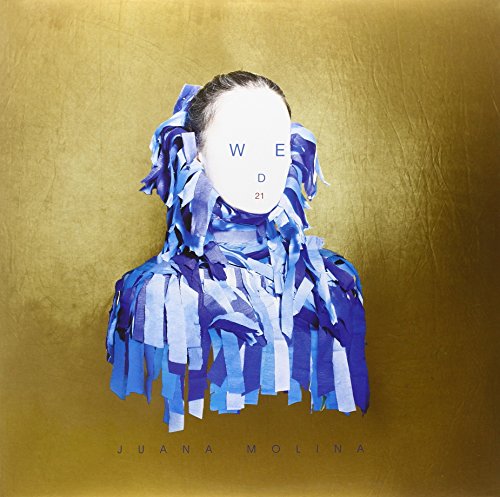
Juana Molina
Wed 21
Release Date: Oct 29, 2013
Genre(s): Pop/Rock, Alternative/Indie Rock
Record label: Crammed Discs
Music Critic Score
How the Music Critic Score works
Buy Wed 21 from Amazon
Album Review: Wed 21 by Juana Molina
Great, Based on 9 Critics
Based on rating 87%%
The five years that have come and gone since Juana Molina’s softly brilliant Un día haven’t hardened—or even changed a little bit of—the subtle contours of her sound. The Argentinian electro-folkie has kept her sense of play and lusty experimentation intact while mulling over time (“Eras”) and tides (the title track), in both English and Spanish, with a rusty (not as in unpracticed, but of the oxidation process), organic vibe brushing against its wheezy, clean sequencers. Not content to allow the serenity of her soft vocal lines to lilt longingly and calmly through the somber melodies of “Ferocímo” and “Ay no se ofendan,” Molina blurs, distorts and fuzzes each element of her arrangements until each sonic chunk becomes something as textural as tree bark.
Based on rating 4
Argentinian singer/songwriter and actress/comedian Juana Molina has always been, as a musician, a restrained, playful electrofolk artist who has never quite let loose enough to reach her full potential. Considering that Molina hosted a popular comedy show in Argentina during the ’90s, it was surprising that 2004’s Tres Cosas, 2006’s Son, and 2008’s Un Día were fine releases that seemed, if anything, a bit too tasteful. But now, Molina has released perhaps her best effort.
Based on rating 8/10
If one adjective sums up Juana Molina’s recent work, it is “dreamlike”. And I don’t mean “dreamlike” as in soft lullabies or swooning chamber pop—I mean instead that narrow register of the musical spectrum where the adjective “beautiful” sits side by side with “unnerving” and “unearthly”. Better, it seems, than any other musician out there, Molina has long recognized the slippery nature of dreams.
Based on rating 8/10
In the five years since Argentine singer/songwriter Juana Molina released Un Dia, her sound has undergone a subtle but distinct shift. On Wed 21 (named for the date she finished the title track, Wednesday, November 21), the intricate layering of electronics, from rhythms to delays and adornments, remains intact, as does her organic reliance on lyric melody. What is immediately apparent is the wider instrumental palette at work.
Based on rating 8/10
The problem with being too consistent is that it’s oftentimes looked upon as a weakness, when in truth, it can take many forms. Argentinean singer-songwriter Juana Molina has set her own course for over fifteen years, steadily reinventing herself in an almost imperceptible manner. She’s a true individual who’s never been swayed by prevailing musical trends, converting her minimal psych-folk suites into intoxicating soundscapes of awe and wonder.
Based on rating 7.3/10
The cover of Wed 21, the first album in five years from Argentinian musician Juana Molina, depicts a featureless face with the words of the title spelled out over it. It's a curious choice of imagery to accompany a comeback, perhaps suggesting a blank slate, a clearing out of what came before, a chance to start anew. But Wed 21 isn't a reinvention, or any kind of new dawn for Molina.
Based on rating 7/10
Juana Molina was, once upon a time, famous in her native Argentina for her work as a television impressionist. That being the case, there’s a sense of irony that the musical side of her career has seen her put her insignia on a fairly inimitable sound. Wed 21, her first album in five years (the biggest gap between releases to date) and her sixth overall, follows the trajectory of her previous work – particularly the unsettling tumult of 2008’s Un Día – but incorporates new forms of instrumentation into her traditional mix, from the conventional (electric guitars) to the out-there (a creaking door, by the sound of it).
Based on rating 6.5/10
Listening to Juana Molina, you would never know she had a strong run as a comedian in her native Argentina. Molina is classed under the singer/songwriter tab. Her left-of-center style, however, has more in common with jazz scats, but softened by rounded Spanish syllables. On her sixth album, Wed 21, Molina—who employs electronics as much, if not more so, than traditional instruments—extends her musical palette to warmer, organic instrumentation.
Opinion: Absolutly essential
My album of the year, but any album Juana Molina drops is going to be my album of the year. She makes you feel as if everything else is just making do, marking time, a pretence of engagement you've kept up while waiting for her latest transmission. Molina has released two of the very very best records of the past decade in 2006's Son and 2008's Una Dia and they were records that insisted, if you let them in, that you'd develop an almost cult-ish obsession with her, dissatisfaction with near-enough everything else.
'Wed 21'
is available now

